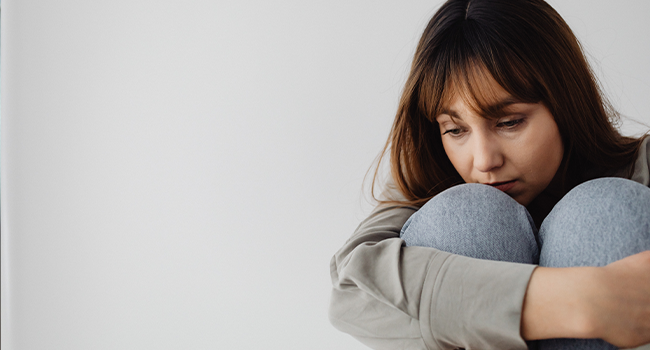Zoloft has a
Zoloft, which is widely known by the generic name sertraline, belongs to a class of medication called selective serotonin reuptake inhibitors (SSRIs). It is commonly prescribed to treat mental health conditions, including social anxiety disorder, major depressive disorder, panic disorder, obsessive-compulsive disorder, premenstrual dysphoric disorder, and post-traumatic stress disorder. While Zoloft can be very effective in reducing symptoms of depression, anxiety, and other conditions, it is known to cause insomnia.
Highlights
- Zoloft (sertraline) can cause insomnia by altering brain chemistry and affecting REM sleep.
- Insomnia symptoms from Zoloft may be temporary and often improve as your body adjusts to the medication.
- If antidepressants cause insomnia, strategies like relaxation techniques, lifestyle changes, and CBT-I can help support better sleep.
- Consult your healthcare provider for appropriate insomnia treatment if sleep disturbances caused by Zoloft don’t go away or worsen.
Why Does Zoloft Cause Insomnia?
People often assume that insomnia means that you have trouble falling asleep. However, it can involve difficulty falling asleep, staying asleep, or waking up too early and being unable to return to sleep.
For many, Zoloft insomnia presents as trouble sleeping or disrupted sleep cycles during the first few weeks of treatment. This side effect is common — up to 20% of people experience some type of insomnia when taking Zoloft (sertraline) according to

Zoloft affects brain chemistry and works by increasing the serotonin level in the brain. Serotonin is a chemical neurotransmitter that regulates your mood. However, this change in chemical balance, in addition to affecting other neurotransmitters in the brain, can affect your sleep patterns.
Other Side Effects of Zoloft
Besides insomnia, Zoloft can commonly cause other side effects; they typically go away in the first few weeks as your body adjusts to the medication. These include:
- Headache
- Nausea
- Fatigue
- Dry mouth
- Diarrhea
- Dizziness
- Increased sweating or night sweats
- Erectile dysfunction
While most people tolerate sertraline well, more serious side effects can occur. These may include serotonin syndrome — a rare but life-threatening condition characterized by confusion, fever, muscle stiffness, and seizures, as well as an increased risk of suicidal thoughts, particularly in adolescents and young adults.
Other potential risks include abnormal bleeding (such as nosebleeds or bleeding gums), low blood sodium levels (which can cause fatigue, nausea, headaches, or irritability), and angle-closure glaucoma, a medical emergency marked by eye pain, redness, and vision changes.
Zoloft Recommended Dosage
The dosage of Zoloft your healthcare provider prescribes will depend on your medical history and the severity of your symptoms. For depression and anxiety disorders, the usual starting dose is 25 mg to 50 mg once per day. Based on how you respond to the medication, the dose can slowly be increased up to a maximum of 200 mg per day.
Doctors often recommend taking Zoloft in the morning to reduce sleep issues. However, if drowsiness becomes a problem, it may be more appropriate to take the medication in the evening.
Zoloft can be taken with or without food, but consistency is important — take it at the same time each day. If a dose is missed, it should be taken as soon as you remember unless it’s almost time for the next dose. In that case, skip the missed dose and continue your regular dosing schedule. Do not double up on the next dose.
The dosages are provided for informational purposes only. Follow the instructions given by your healthcare provider and never exceed the prescribed dose.

How to Help Yourself Sleep While Taking Zoloft
Although sleep-related issues are a common side effect of this medication, some patients will not experience insomnia while taking Zoloft. However, if you are experiencing insomnia, the following measures could be helpful.
1. Take Zoloft in the Morning
In some patients, the stimulating properties of Zoloft on the central nervous system may cause insomnia, restlessness, and jitteriness, particularly when taken later in the day. If you’re taking Zoloft and can’t sleep, taking it in the morning might help. Sertraline takes several hours to be fully absorbed into your bloodstream. Taking it in the morning allows its levels to decrease by nighttime, which may help reduce the risk of insomnia.

2. Practice Good Sleep Hygiene
Poor sleeping habits can also cause insomnia. Practicing good sleep hygiene means building good habits and creating a space that makes it easier to fall and stay asleep. This will ensure your body learns to associate your bedroom with sleep.
Some ways to practice good sleep hygiene include:
- Keep a consistent sleep schedule, waking up and going to sleep at the same time every day.
- Avoid having blue light-emitting gadgets in your bedroom, including computers, laptops, and smartphones.
- Create a dark, quiet, and cool sleeping environment.
- Invest in a comfortable mattress and pillow.
- Get some early morning sunshine.
3. Avoid Smoking
4. Exercise Regularly
Physical activity has been
5. Avoid Alcohol and Caffeinated Beverages
Alcohol initially acts as a sedative, so it can make you fall asleep faster. But alcohol intake also
Caffeine acts as a stimulant, keeping you up and disrupting sleep patterns. If you drink beverages such as coffee, tea, or sodas at or near bedtime, you may have difficulty falling asleep. One study found caffeine consumed as much as 6 hours before bedtime could affect sleep.
6. Consider Melatonin
Melatonin is a natural hormone produced by a gland in the brain that helps regulate your body’s sleep-wake cycle. Melatonin is a common sleep aid that provides additional support by boosting levels of this hormone, which can help promote sleep in some people. Note that melatonin interacts with many medications, so it’s better to consult with your medical provider before taking it.
7. Use Relaxation Techniques
Mind-body therapies such as meditation, deep breathing exercises, and yoga
8. Try Cognitive Behavioral Therapy
Cognitive behavioral therapy for insomnia (CBT-I) has
9. Talk With Your Doctor
If you are having trouble with sleep while taking Zoloft, talk with your doctor or mental health professional. They may try a lower dosage to help minimize sleep side effects. Sometimes, people still experience side effects at a low dose. In this case, your healthcare provider may recommend changing to a different medication to reduce insomnia symptoms.
Withdrawal Syndrome
Zoloft can cause adverse
When to Contact a Doctor
Reach out to your healthcare provider if you’re experiencing chronic insomnia that lasts longer than a month, is bothersome, or significantly affects your mood or daily functioning. In addition, contact your healthcare provider right away if you experience other serious side effects, such as suicidal thoughts or worsening depression or anxiety.
If you’re experiencing suicidal or self-harming thoughts and require immediate assistance, contact a crisis hotline, such as 911, 988 suicide & crisis lifeline (toll-free), or Samaritans (116-123 or via chat).
In Closing
Although Zoloft is commonly used to treat depression, panic disorder, anxiety disorders, and other mental health conditions, it can cause insomnia. If you experience insomnia caused by Zoloft, talk to your healthcare provider for guidance before stopping the medication. They can give you recommendations on ways to manage insomnia and get better sleep. For personalized recommendations, sign up at MEDvidi today and have an online appointment in 24 hours.
Frequently Asked Questions
Can sertraline make you wake up in the middle of the night?
Yes. Many people taking Zoloft report waking up at night or early in the morning. This is a common side effect, particularly when first starting treatment.
Will insomnia from Zoloft go away?
In many cases, yes. Sertraline insomnia is usually temporary and does go away for most people as the body adjusts to the medication. If it persists beyond a month, talk with your doctor.
How long does sertraline insomnia last?
Sertraline insomnia typically goes away within a few weeks. However, every individual is different and it may persist longer in some cases. Contact your healthcare provider if insomnia is prolonged and/or severe.
When is the best time to take Zoloft for sleep?
Morning is generally the best time to take Zoloft to reduce the risk of insomnia.
Why am I sleeping so much on Zoloft?
Some people experience fatigue or sedation instead of insomnia. In this case, it may be better to take Zoloft at night.
Can Zoloft improve sleep?
In the long run, sertraline can help with sleep by reducing symptoms of anxiety or depression, which is a common cause of sleep problems.













